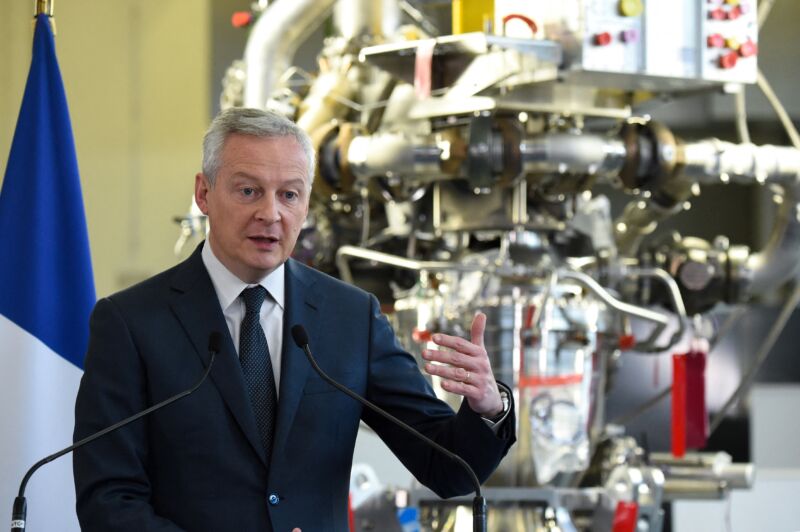Concerned about SpaceX, France to accelerate reusable rocket plans

On Monday French Finance Minister Bruno Le Maire announced a plan for Europe to compete more effectively with SpaceX by developing a reusable rocket on a more rapid timeline.
“For the first time Europe … will have access to a reusable launcher,” Le Maire said, according to Reuters. “In other words, we will have our SpaceX, we will have our Falcon 9. We will make up for a bad strategic choice made 10 years ago.”
The new plan calls for the large, France-based rocket firm ArianeGroup to develop a new small-lift rocket called Maïa by the year 2026. This is four years ahead of a timeline previously set by the European Space Agency for the development of a significantly larger, reusable rocket.
Although the technical details are sparse, Maïa will not be Europe’s “Falcon 9.” It will have a lift capacity of up to 1 metric ton to low Earth orbit and be powered by a reusable Prometheus rocket engine, which is fueled by methane and liquid oxygen. This engine, which remains in the preliminary stages of development, has a thrust comparable to a single Merlin 1D rocket engine, which powers SpaceX’s Falcon 9 rocket. But since there are nine engines on the SpaceX rocket, it can lift more than 15 times as much as the proposed Maïa in fully reusable mode.
Tangled rocket politics
The politics of rockets in Europe are complex and often difficult to disentangle. But there are two major themes underscored by this announcement. One is the distinct and long-running rivalry between France, Germany, and Italy for launch supremacy in Europe, and the other is a tension between institutional launch companies, backed by state governments, and commercial upstarts. This announcement pulls on both of those threads.
France, Germany, and Italy are in a seemingly constant struggle for funding and aerospace jobs. Typically, the European Space Agency sets priorities for rocket development and distributes funding to prime contractors ArianeGroup, which has facilities in France and Germany, and Avio, which is based in Italy.
Notably, the French government will fund development of Maïa on its own. Back in October, President Emmanuel Macron said France would invest €30 billion into a “France 2030” plan to foster industrial innovation. About €1.5 billion of that funding will go toward space enterprises.
Europe realizes that its launch industry has fallen behind more nimble competitors, particularly SpaceX. One of the ways ArianeGroup has sought to compete was to announce job cuts this past September to reduce its costs. However, the French government felt that ArianeGroup’s engine development site in Vernon, France, was particularly hard hit by those cuts.
Le Maire’s announcement seeks to redress this, as Prometheus rocket engine development is taking place at the Vernon location in northern France, and the Maïa rocket will be manufactured there. Le Maire said on Monday there are about 800 jobs at the Vernon-based propulsion site. By 2025, he said, there will be nearly 1,000.
Such statements underscore that the main prize for European governments does not so much seem to be a highly competitive rocket, but ensuring that a maximum number of well-paying space jobs are located within their borders.
Institutions versus startups
Over the last five years Germany, Italy, and the United Kingdom (which is a member of the European Space Agency but not the European Union) have started to foster the development of micro-launch companies that are building rockets capable of lifting several hundred kilograms to low-Earth orbit—a bit less than the Maïa rocket aspires to do.
These companies, including Isar Aerospace, Rocket Factory Augsburg, and HyImpulse in Germany, PLD Space in Spain, and Orbex and Skyrora in Britain, operate much more like the US commercial space industry. Each has relied primarily on private funding for the development of its rocket technologies and plans to compete for commercial contracts to launch small satellites.
France has largely been left out of this new commercial launch industry, and Paris-based ArianeGroup probably would not mind seeing the competition stamped out. In other words, France could be worried enough about losing its launch leadership in Europe.
Giving a large development contract to ArianeGroup for the Maïa rocket would be one way to kill off the competition in other countries before it gets going. Giving money to ArianeGroup now is a little bit like the United States funding United Launch Alliance to build a reusable rocket 15 years ago, which would have substantially harmed or perhaps even killed SpaceX during its formative years.
The French compromise
At the same time, France is also interested in developing a native new space launch industry. French aerospace reporter Vincent Lamigeon said the country plans to soon call for projects on reusable micro-launchers, smaller than the Maïa project. Nascent startups French Venture Orbital Systems and Strato Space Systems are expected to compete, with the French space agency providing technical support to the winners and launch contracts.
“It’s a real break from French strategy, and clearly inspired by the USA,” Lamigeon said.
The new plan from the French, therefore, involves working with Germany, France, and Italy on development of the Ariane 6 rocket, which will perform medium- and heavy-lift launches for the continent, including of European science satellites and other government payloads, and competing globally for commercial geostationary satellite launches. But when it comes to small launchers and fostering a commercial space industry, each country seems to be going its own way.
Whether this is enough to compete with SpaceX is a question that probably can be answered with a simple “no.” By 2026 SpaceX probably will be launching Starships for less than Maïa’s price.
SpaceX has more than a full decade head start on Europe in developing a reusable rocket—the first Falcon 9 rocket landed six years ago. And SpaceX’s focus is not on maximizing jobs, it’s on minimizing the need for them in its ruthless pursuit of lower launch costs.
https://arstechnica.com/?p=1818450